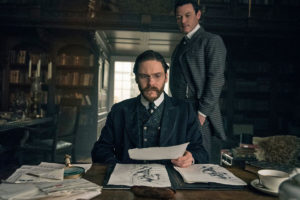Meticulous in its detail, and lush in its recreation of 19th-century New York City, TNT’s 10-part adaptation of Caleb Carr’s The Alienist is on a par with Martin Scorsese’s similar cinematic visits to that period in THE AGE OF INNOCENCE and GANGS OF NEW YORK. While those films separated the mighty and the downtrodden, THE ALIENIST portrays both as it spins the tale of a serial killer who preys upon boys of the lowest social class while the ruling classes pay little heed, and show even less empathy.
Daniel Brühl stars as Dr. Laszlo Kreizler, the eponymous alienist, what we today call a psychiatrist. In 1896 when this story takes place, this specialty was thought to cure those alienated from their true nature, hence, as we are reminded by the intertitle that begins the first two episodes. Hence, the term “alienist.” Kreizler consults with the courts from time to time, but prefers to treat children at his private clinic. He finds their minds more interesting. He also finds the prevailing attitudes towards child-rearing abhorrent.
 When a murdered boy is found on a bridge during a snowy winter night, Krieizler, woken from a sound sleep to interview a child who saw the body, is more intrigued by a witness’ account that the boy was wearing a dress than he is by the gruesome condition of the body. Pressing his old Harvard classmate and current illustrator for the New York Times, John Moore (Luke Evans) into service to sketch the scene, he soon discovers that this is the latest in a series of child murders, one with which has a very personal connection to him. The search for the killer will involve and old family friend of Moore’s, Sarah Howard (Dakota Fanning) the first woman hired by the New York City Police Department, albeit as a secretary; and another former Harvard classmate, Police Commissioner Theodore Roosevelt (Brian Geraghty) at the start of the political career that will make him the 25th Commander-in-Chief.
When a murdered boy is found on a bridge during a snowy winter night, Krieizler, woken from a sound sleep to interview a child who saw the body, is more intrigued by a witness’ account that the boy was wearing a dress than he is by the gruesome condition of the body. Pressing his old Harvard classmate and current illustrator for the New York Times, John Moore (Luke Evans) into service to sketch the scene, he soon discovers that this is the latest in a series of child murders, one with which has a very personal connection to him. The search for the killer will involve and old family friend of Moore’s, Sarah Howard (Dakota Fanning) the first woman hired by the New York City Police Department, albeit as a secretary; and another former Harvard classmate, Police Commissioner Theodore Roosevelt (Brian Geraghty) at the start of the political career that will make him the 25th Commander-in-Chief.
The investigation will reveal the institutional corruption Roosevelt has tasked himself with ending, and the casual brutality of life for anyone not rolling in wealth and white male privilege. The degradations Howard faces; the callousness of a coroner about the death of a boy prostitute; and the grim reality of an overcrowded tenement are at least as horrifying as the savaged corpse of the boy on the bridge.
Horror is presented with an elegance that makes it all the more disturbing. A severed hand, a drop of blood on a startled policeman’s face, and the hollow-eyed shock of the child recounting what he’s seen on the bridge prepare us for finally seeing the corpse itself, but not before there is one more reaction shot from Moore, as he recoils and had trouble settling down to sketch. It’s only then that we see the empty eye=sockets as the camera zooms in on them, and the through to the next scene. The sumptuous excess of dinner at Delmonico’s, a feast for the eyes as rich and decadent as the meal must have been for the diners, stand in contrast with the desperate lives of those in the tenements, augmented by a discussion of socialism by two Jewish police officers struggling with the non-kosher wine as they ebulliently discourse on the exact instrument used to remove the victim’s eyes.
A setting would be nothing without characters worth watching and actors adding shades and substance. Brühl has a  clinical enthusiasm for his calling of inventing criminal profiling that mirrors the series’ unflinching depiction of the brutality of the times, from the ugly marks left by Howard’s corset to the cow heads used by the Isaacsons in their experiments in their essays into proto-criminal forensics. Evans has the right air of melancholy as a man with issues that require psychodramas played out in houses of ill-repute, and Fanning is steel and grit, resentful of a woman’s designated place, but picking her battles with cool assurance and not a little bravado. All have deeper mysteries, no doubt to be explored further in the eight further episodes unavailable for preview. Things such as why Krieizler coolly, but pointedly, refuses Howard’s proffered handshake, and why Howard, a woman of means, chooses to work at all, much less in the seediness of the 19th century NYPD, as well as the tantalizing backstory of Kreizler’s silent servant, Mary Palmer (Q’orianka Kilcher).
clinical enthusiasm for his calling of inventing criminal profiling that mirrors the series’ unflinching depiction of the brutality of the times, from the ugly marks left by Howard’s corset to the cow heads used by the Isaacsons in their experiments in their essays into proto-criminal forensics. Evans has the right air of melancholy as a man with issues that require psychodramas played out in houses of ill-repute, and Fanning is steel and grit, resentful of a woman’s designated place, but picking her battles with cool assurance and not a little bravado. All have deeper mysteries, no doubt to be explored further in the eight further episodes unavailable for preview. Things such as why Krieizler coolly, but pointedly, refuses Howard’s proffered handshake, and why Howard, a woman of means, chooses to work at all, much less in the seediness of the 19th century NYPD, as well as the tantalizing backstory of Kreizler’s silent servant, Mary Palmer (Q’orianka Kilcher).
Told with moody atmospherics reminiscent of film noir, and an anachronistic techno-score that meshes perfectly with tense air of suspense and darkness that pervade the action, THE ALIENIST is a fine walk on the dark side of human nature that will keep you on the edge of your seat even as it also slyly invites us, with its portrait of an outdated status-quo, to question how the automatic assumptions and cultural norms of today will be viewed by our descendants.
Your Thoughts?